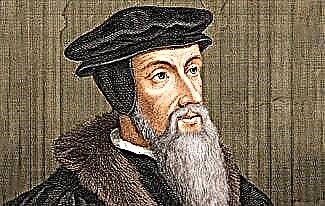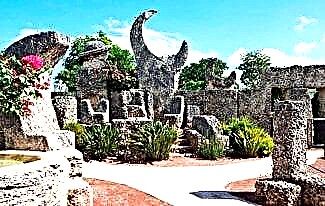Otto Eduard Leopold von Bismarck-Schönhausen, Duke of zu Lauenburg (1815-1898) - the first chancellor of the German Empire, who implemented the plan for the unification of Germany along the lesser German path.
Upon retirement, he received the non-inherited title of Duke of Lauenburg and the rank of Prussian Colonel General with the rank of Field Marshal.

There are many interesting facts in the biography of Bismarck, which we will talk about in this article.
So, before you is a short biography of Otto von Bismarck.
Biography of Bismarck
Otto von Bismarck was born on April 1, 1815 in the province of Brandenburg. He belonged to a knightly family, which, although considered noble, could not boast of wealth and land holdings.
The future chancellor grew up in the family of a landowner Ferdinand von Bismarck and his wife Wilhelma Mencken. It is worth noting that the father was 18 years older than his mother. In addition to Otto, 5 more children were born in the Bismarck family, three of whom died in childhood.
Childhood and youth
When Bismarck was barely 1 year old, he and his family moved to Pomerania. His childhood was difficult to call joyful, since his father often beat and humiliated his son. At the same time, the relationship between the parents was also far from ideal.
Young and educated Wilhelma did not find interest in communicating with her husband, who was a village cadet. In addition, the girl did not pay enough attention to the children, as a result of which Otto did not feel maternal affection. According to Bismarck, he felt like a stranger in the family.

When the boy was 7 years old, he was sent to study at a school that focused on physical development. However, studying did not give him any pleasure, about which he constantly complained to his parents. After 5 years, he continued to receive his education at the gymnasium, where he studied for 3 years.
At the age of 15, Otto von Bismarck moved to another gymnasium, where he showed an average level of knowledge. During that period of his biography, he mastered French and German, paying great attention to reading the classics.
At the same time, Bismarck was fond of politics and world history. Later he entered the university, where he did not study very well.
He made many friends, with whom he led a wild life. An interesting fact is that he participated in 27 duels, in which he was wounded only once.
Otto later defended his dissertation in philosophy in the field of political economy. After that, he was engaged in diplomatic activities for some time.
Career and military service
In 1837 Bismarck went to serve in the Greifswald battalion. After 2 years, he was informed about the death of his mother. He and his brother soon took over the management of the family's estates.
Despite his hot temper, Otto had a reputation as a calculating and literate landowner. From 1846 he worked in the office, where he was involved in the management of the dams. It is curious that he considered himself a believer, adhering to the teachings of Lutheranism.
Every morning, Bismarck began by reading the Bible, meditating on what he had read. During this time of his biography, he visited many European states. By that time, his political views had already been formed.
The man wanted to become a politician, but the reputation of a hot-tempered and riotous duelist hampered the development of his career. In 1847 Otto von Bismarck was elected deputy of the United Landtag of the Prussian Kingdom. It was after this that he began to rapidly climb the career ladder.

Liberal and socialist political forces defended rights and freedoms. In turn, Bismarck was a supporter of conservative views. The associates of the Prussian monarch noted his oratorical and mental abilities.
Defending the rights of the monarchy, Otto ended up in the opposition camp. He soon formed the Conservative Party, realizing that he had no way back. He advocated the creation of a single parliament and the subordination of its authority.
In 1850, Bismarck entered the parliament of Erfurt. He criticized the political course, which could lead to a conflict with Austria. This was due to the fact that he understood the full power of the Austrians. He later became a minister in the Bundestag of Frankfurt am Main.
Despite a little diplomatic experience, the politician was able to quickly get used to and become a professional in his field. At the same time, he acquired more and more authority in society and among colleagues.

In 1857 Otto von Bismarck became the Ambassador of Prussia to Russia, having served in this post for about 5 years. During this time, he mastered the Russian language and became well acquainted with Russian culture and traditions. An interesting fact is that later the German will say the following phrase: "Make alliances with anyone, unleash any wars, but never touch the Russians."
The relationship between Bismarck and Russian officials was so close that he was even offered a position at the Emperor's court. With the accession to the throne of William I in 1861, another significant event took place in Otto's biography.
That year, a constitutional crisis hit Prussia amid a clash between the monarch and the Landtag. The parties failed to find a compromise on the military budget. Wilhelm called for help from Bismarck, who was then working as ambassador to France.
Politics
Loud feuds between Wilhelm and the liberals helped Otto von Bismarck become one of the most important figures in the state. As a consequence, he was entrusted with the posts of prime minister and foreign minister to help reorganize the army.
The proposed transformations did not have support from the opposition, who knew about Otto's ultra-conservative position. The confrontation between the parties was suspended for 3 years due to popular unrest in Poland.
Bismarck offered help to the Polish ruler, as a result of which he caused discontent among the European elite. Nevertheless, he secured the trust of the Russian emperor. In 1866, war broke out with Austria, along with the division of state territories.
Through professional diplomatic action, Otto von Bismarck was able to enlist the support of Italy, which became an ally of Prussia. The military success helped Bismarck find favor in the eyes of his compatriots. In turn, Austria lost its power and no longer posed a threat to the Germans.
In 1867, the man formed the North German Confederation, which led to the unification of the principalities, duchies and kingdoms. As a result, Bismarck became the first chancellor of Germany. He approved the suffrage of the Reichstag and got all the levers of power.

The French head, Napoleon III, was dissatisfied with the unification of states, as a result of which he decided to stop this process with the help of armed intervention. War broke out between France and Prussia (1870-1871), which ended in a devastating victory for the Germans. Moreover, the French monarch was captured and captured.
These and other events led to the founding of the German Empire, the Second Reich, in 1871, of which Wilhelm I became Kaiser. In turn, Otto himself was awarded the title of prince.
During this period of his biography, von Bismarck controlled and deterred any threats from the Social Democrats, as well as Austrian and French rulers. For his political acumen, he was nicknamed the "Iron Chancellor". At the same time, he made sure that no serious anti-German forces were created in Europe.

The German government did not always understand Otto's multi-step actions, as a result of which he often irritated his colleagues. Many German politicians tried to expand the territory of the state through wars, while Bismarck was not a supporter of colonial policy.
The young colleagues of the Iron Chancellor wanted as much power as possible. In fact, they were not interested in the unity of the German Empire, but in world domination. As a result, 1888 turned out to be “the year of the three emperors”.
Wilhelm I and his son Frederick III died: the first from old age, and the second from throat cancer. Wilhelm II became the new head of the country. It was during his reign that Germany actually unleashed the First World War (1914-1918).
As history will show, this conflict will prove fatal for the empire united by Bismarck. In 1890, the 75-year-old politician resigned. Soon, France and Russia allied with Britain against Germany.
Personal life
Otto von Bismarck was married to an aristocrat named Johann von Puttkamer. Biographers of the politician say that this marriage turned out to be very strong and happy. The couple had a daughter, Maria, and two sons, Herbert and Wilhelm.
Johanna contributed to her husband's career and success. Some believe that the woman played an important role in the German Empire. Otto became a good spouse, despite a short romance with Ekaterina Trubetskoy.
The politician showed a keen interest in horse riding, as well as a very unusual hobby - collecting thermometers.
Death
Bismarck spent the last years of his life in full prosperity and recognition in society. After his retirement, he was awarded the title of Duke of Lauenburg, although he never used it for personal purposes. From time to time he published articles criticizing the political system in the state.
The death of his wife in 1894 was a real blow to the Iron Chancellor. 4 years after the loss of his wife, his health deteriorated sharply. Otto von Bismarck died on July 30, 1898 at the age of 83.
Bismarck Photos


















